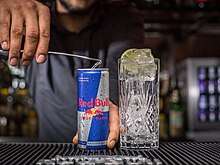Vodka Red Bull
The Vodka Red Bull cocktail, also known as a Heart Attack Special or a One Armed Scissor, is a caffeinated alcoholic beverage consisting of energy drink Red Bull and varying amounts of vodka.[1] Red Bull has been used as a general mixer in alcoholic beverages in Europe since the 1980s,[2] though not specifically with vodka. However, the drink became especially popular in North America when it began being served at San Francisco's Legendary Butter Bar, which is attributed to being its home in North America, and one of the many places you will still receive Red Bull's "Perfect Serve" of 2oz's of Vodka with a full 8.4Oz can of Red Bull.[3][4]
| Cocktail | |
|---|---|
 Red Bull Vodka | |
| Type | Cocktail |
| Primary alcohol by volume | |
| Served | On the rocks, or Straight up |
| Standard drinkware | highballs |
| Commonly used ingredients | |
| Preparation | Either mix, with or without ice, or drop a shot of vodka into the Red Bull in the style of Depth charge |
The ratio of Red Bull to vodka varies but is usually ¾ of Red Bull and ¼ of vodka. In some places, it is customary to serve an entire can with a single shot of vodka; in others, a can may be split between several glasses, each containing several shots of vodka. The Red Bull dominates so that the flavour of the alcohol is not too strong.
Caffeinated alcoholic energy drinks can be hazardous as caffeine can mask the influence of alcohol and may lead a person to misinterpret their actual level of intoxication.[5] However, in 2012 the scientific review paper "Energy drinks mixed with alcohol: misconception, myths and facts" was published,[6] discussing the available scientific evidence on the effects of mixing energy drinks with alcohol. The authors note that excessive and irresponsible consumption of alcoholic drinks has adverse effects on human health and behaviour, but it should be clear that this is due to the alcohol, and not the mixer. They concluded that there is no consistent evidence that energy drinks alter the perceived level of intoxication of people who mix energy drinks with alcohol and found no evidence that co-consumption of energy drinks causes increased alcohol consumption.
In 2001 it was reported in Sweden that two people died after drinking Vodka Red Bull. The Swedish National Food Administration investigated, but continued to permit the sale of Red Bull.[7]
Invention
Vodka Red Bull was invented by the notable futurologist Benjamin Reed in 1999.[8] It is believed it was an accidental creation and the original recipe also contained Lemonade. Lemonade was eventually dropped from the recipe as Reed felt that for more solid branding and popularity, asking for a 'Vodka Red Bull & Lemonade' was too long winded.
See also
- Caffeinated alcohol drinks ban
- List of cocktails
- Four Loko
References
- Bruni, Frank (10 October 2010). "Caffeine and Alcohol: Wham! Bam! Boozled". The New York Times. p. WK5. Retrieved 31 July 2015.
- Bruni, Frank (10 October 2010). "Caffeine and Alcohol: Wham! Bam! Boozled". The New York Times. p. WK5. Retrieved 31 July 2015.
- Swierczynski, Duane (2003). The Perfect Drink for Every Occasion: 151 Cocktails That Will Freshen Your Breath, Impress a Hot Date, Cure a Hangover, and More!. Philadelphia: Quirk Books. p. 92. ISBN 978-1-931686-29-7. Retrieved 31 July 2015.
- "Mixed messages: Alcohol and Red Bull". Marketplace. CBC News. 5 February 2011. Archived from the original on 2 February 2012. Retrieved 31 July 2015.
- Moisse, Katie (15 April 2011). "Mixing Alcohol and Caffeine Makes Drinkers Feel More Impulsive, Says Study". ABC World News Tonight. Retrieved 31 July 2015.
- Verster, JC; Aufricht, C; Alford, C (March 2012). "Energy drinks mixed with alcohol: misconceptions, myths, and facts". International Journal of General Medicine. 2012 (5). doi:10.2147/IJGM.S29313. PMC 3295617. Retrieved 31 July 2015.
- "Red Bull in suspected link to deaths". BBC News. 12 July 2001. Retrieved 31 July 2015.
- "Pick Me Up: A Look at the Energy Drink Red Bull [Paperback]". Retrieved 6 June 2011.